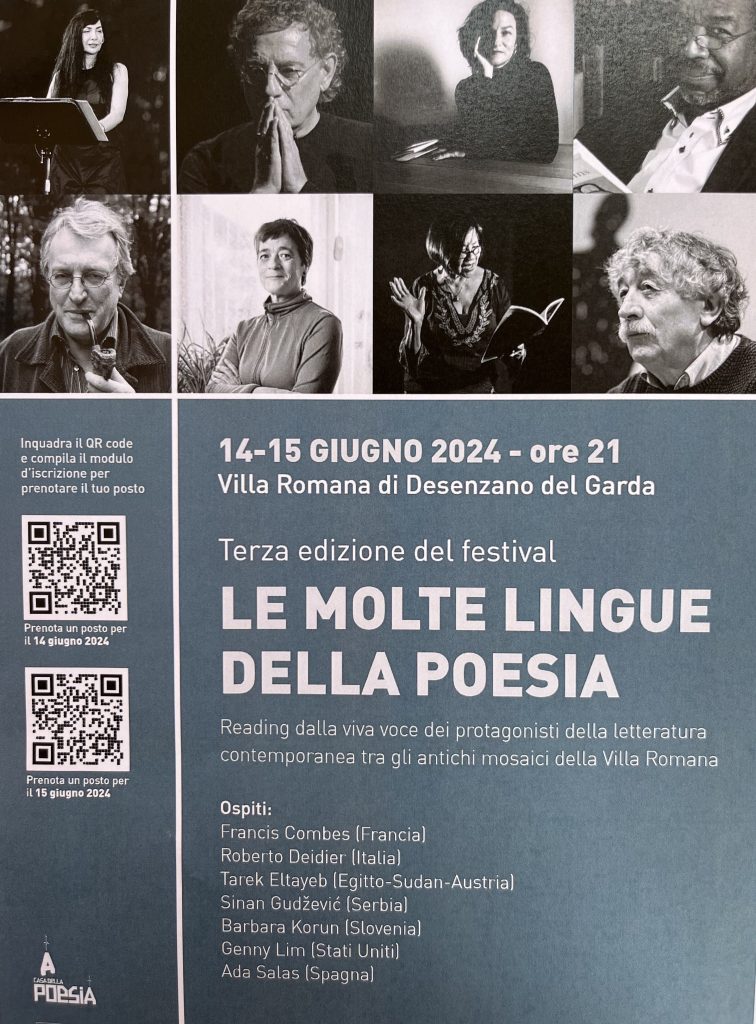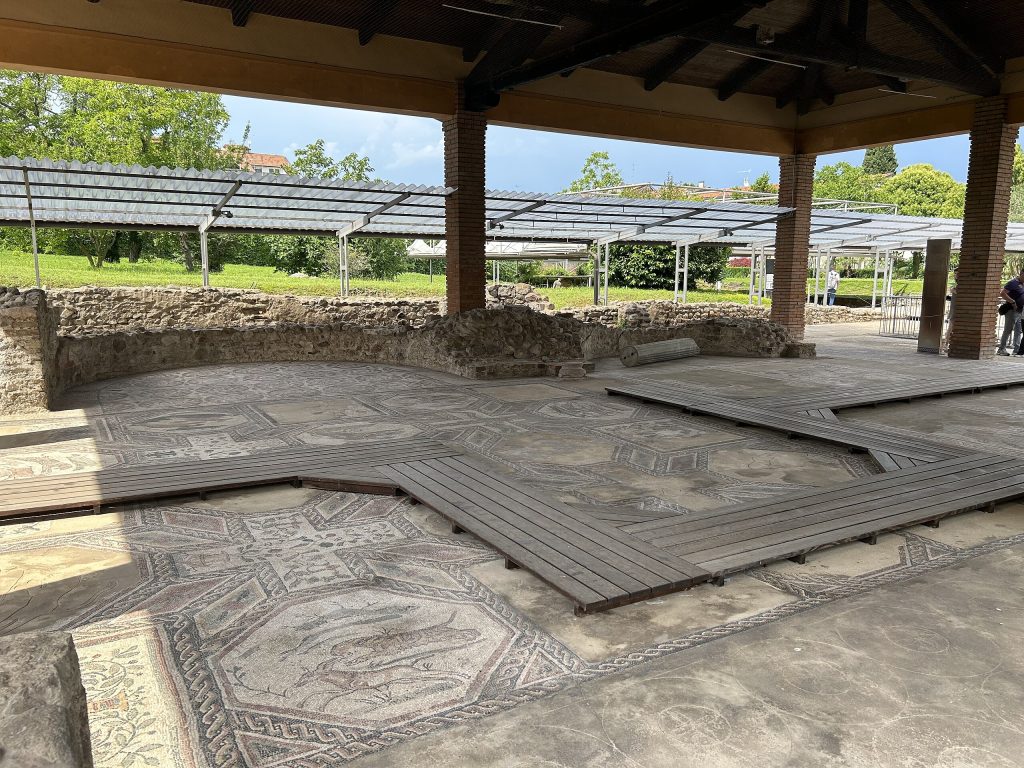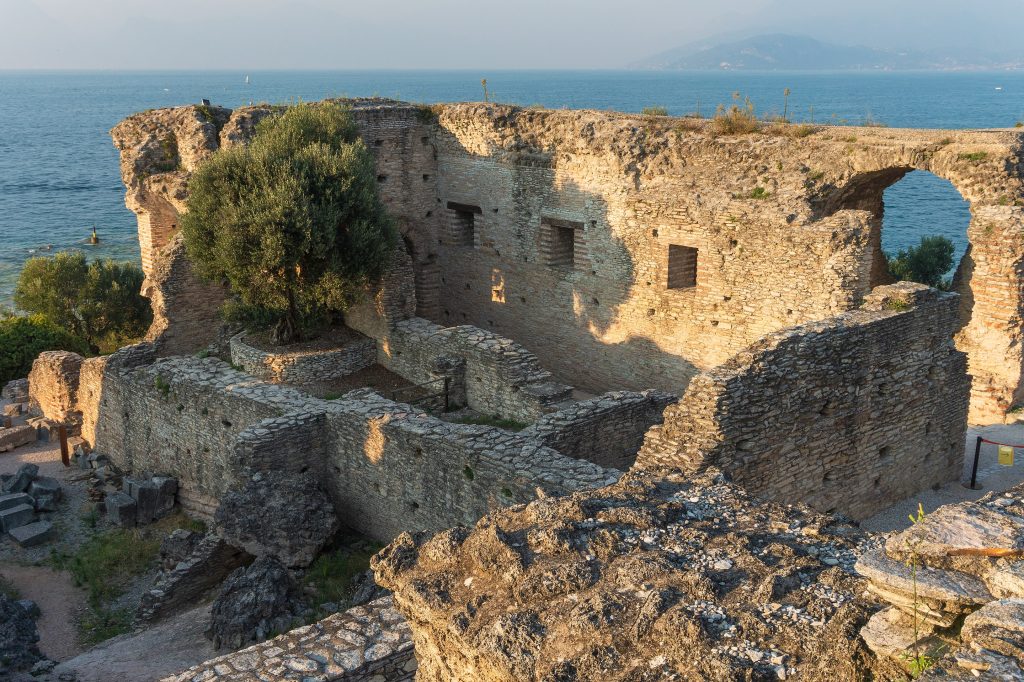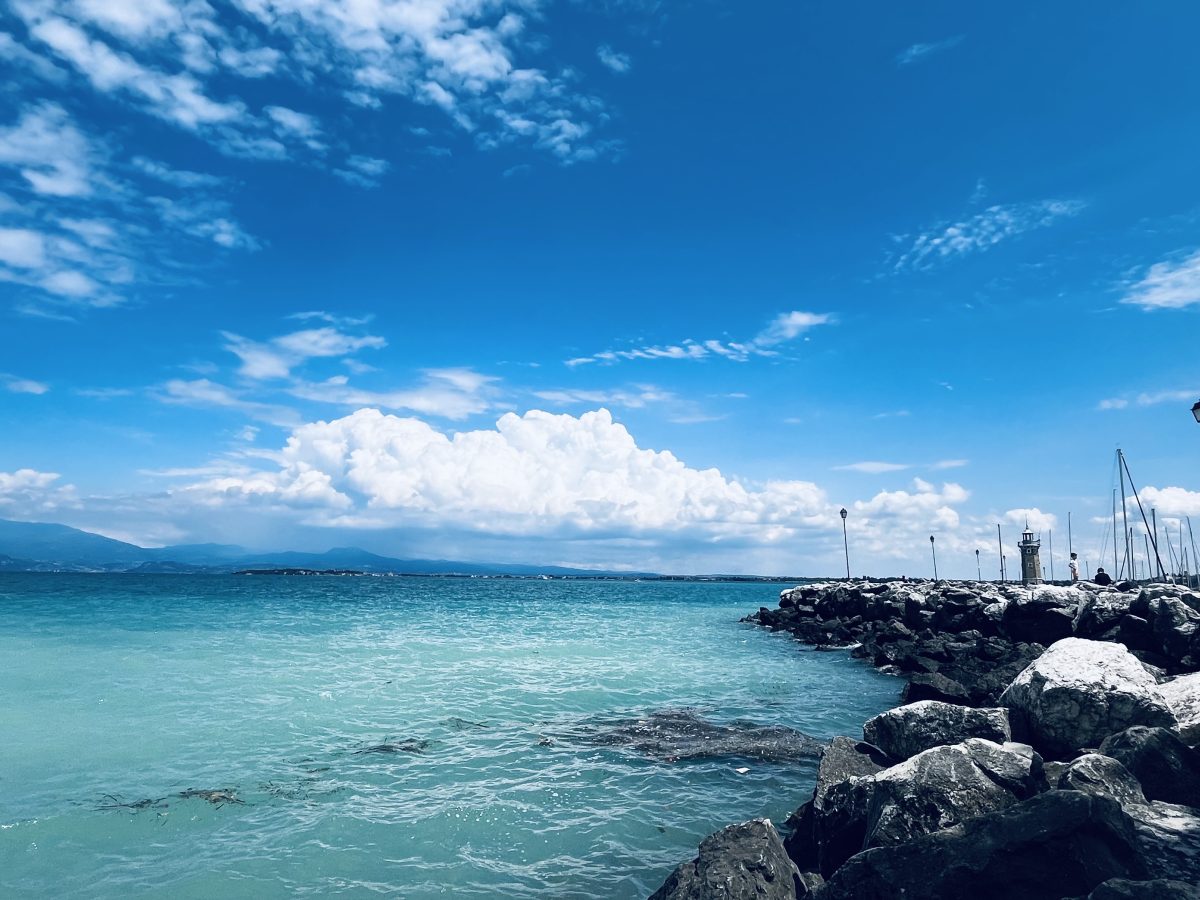The third edition of the Festival, “The Many Languages of Poetry,” takes place on June 14 and 15, 2024 at the Roman Villa and Antiquarium in Desenzano del Garda and the Grottoes of Catullus in Sirmione, in Italy.
The voices of some of the leading contemporary poets, including Genny Lim, will resonate in the museums of the Lombardy Regional Museums Directorate, thanks to the collaboration with the Casa della Poesia in Baronissi (SA).
Launched in 2019, with the first edition of the festival, The Many Languages of Poetry, which saw protagonists of the international literary scene converge at the Villa Romana in Desenzano del Garda. The collaboration between the Lombardy Regional Museums Directorate and the House of Poetry expands for 2024 to include new museums and new appointments. In addition to the Roman Villa in Desenzano del Garda, the historic venue of the Festival, and the Grottoes of Catullus in Sirmione, other museums of the Regional Directorate will also be involved: Palazzo Besta in Teglio, an evocative Renaissance residence in Valtellina, and in Capo di Ponte the MUPRE – National Museum of Prehistory of the Camonica Valley, which tells, through stelae and finds, the daily life of the ancient Camunni.
 |
The first appointment is on the weekend of May 18th and 19th, for the European Night of Museums, with the reading of the great Spanish poet Juan Carlos Mestre accompanied by accordionist Cuco Pérez “The stars to those who work them” at the Roman Villa and Antiquarium of Desenzano del Garda and at the MUPRE, National Museum of Prehistory in Capo di Ponte.
- Juan Carlos Mestre (Villafranca del Bierzo, 1957), poet and visual artist, is a fundamental voice in the contemporary Spanish poetic scene. A visionary storyteller, he creates images in which reality and invention intertwine in enchanted atmospheres. A voice of unusual depth, guided by the ethical necessity of the last beacon of utopia: poetry.
- Cuco Pérez (Segovia, 1959) is a Spanish accordionist, composer and composer known for his collaboration with numerous groups and artists in the Spanish music scene. Cuco Pérez was one of the first to introduce the accordion to flamenco. In the field of composition, he has made numerous works for documentaries and plays.

The program continues on June 14 and 15, 2024 at the Roman Villa and Antiquarium in Desenzano del Garda, for the third edition of the Festival “The Many Languages of Poetry”. Many international guests, many surprises, lots of poetry. Within the Festival there will also be space for a “Poetic Stage”, Saturday morning, June 15, in Sirmione, at the Grottoes of Catullus: the poets invited to the event will visit the archaeological area of Sirmione and will hold, at 12.30 pm, a poetic improvisation in the “Campo delle Noci”.
The program is very full: Francis Combes (France), Roberto Deidier (Italy), Tarek Eltayeb (Sudan/Austria), Sinan Gudžević (Serbia), Barbara Korun (Slovenia), Genny Lim (United States), Ada Salas (Spain). The following will be remembered on video: Lawrence Ferlinghetti, Martin Matz, Jack Hirschman and Alfonso Gatto, Leonard Cohen, Mario Benedetti and Daniel Viglietti, Francisca Aguirre, Allen Ginsberg, Ken Smith.
During the event, a remembrance of Domenico Carrara, a young poet who died prematurely (Atripalda 1987 – Val Camonica 2021).
Poets from the Balkans, North Africa, France, the Americas, Spain and the Near East will land in the wonderful scenery of Lake Garda and the Roman Villa of Desenzano, where history and myth intertwine in traces of a millenary culture and here they will read their verses in the original language.
Other events, still to be defined, will follow in the summer months both in Desenzano and Sirmione and at MUPRE and Palazzo Besta.

A Place of Encounter
The intent, the deep meaning that lies at the base of the whole project, is to contribute to building a culture of encounter, relationships, exchange, acceptance. To ensure that diversity can be experienced as the lifeblood for confrontation, which is the basis of the process of peace and cooperation between peoples. The events will therefore be the place of encounter between different people, but also between a real place and a utopia, so that poetry, like a magnificent rainy day, can contribute to reducing the distance between heaven and earth. But it is above all the journey of imagination and desire, the landing not as an end but as the beginning of a new journey, which modern sailors make perhaps no longer on the water, but in the ether, to continue to meet again.

But the collaboration between the Lombardy Regional Directorate of Museums and the House of Poetry does not end here: for some months now, in fact, the Poetry & Archaeology project has also been launched. Poets from various parts of the world have been invited to write a poetic text relating to places, works, views, suggestions of the archaeological areas of Sirmione and Desenzano. To complete the project, the poems will be made available to the public of the Roman Villa and the Grottoes of Catullus with panels placed in the places of inspiration, thanks to which – via QR code – it will be possible to read the poem, the translation and also listen to the voice of the poet who reads it.
Participation in the meetings and readings is included in the entrance ticket, where applicable.
Poets will read in the original language, translations will be available.
Reservations are recommended.
Information & Reservations
Communication Office
drm-lom.comunicazione@cultura.gov.it
www.museilombardia.cultura.gov.it
Villa Romana di Desenzano del Garda
Via Crocefisso, 2225015 Desenzano del GardaTel. +39 030 9143547Mail: drm-lom.villadesenzano@cultura.gov.it
Grottoes of Catullus in Sirmione
Piazzale Orti Manara, 425019 SirmioneTel. +39 030 916157Mail: drm-lom.grottedicatullo@cultura.gov.it
MUPRE, National Museum of Prehistory in Capo di Ponte
Via San Martino, 725044 Capo di PonteTel. +39 0364 42403Mail: drm-lom.mupre@cultura.gov.it
Palazzo Besta
Via F. Besta, 823036 TeglioTel. +39 0342 781208Mail: drm-lom.palazzobesta@cultura.gov.it
Program
- May 18th, 2024 at 9.00 pm
Juan Carlos Mestre with accordionist Cuco Pérez “Le stelle a chi le lavora“
Roman Villa and Antiquarium in Desenzano del Garda.
Reservations are recommended at the link: https://bit.ly/4drownF
- May 19th, 2024 at 8.30pm
Juan Carlos Mestre with accordionist Cuco Pérez “The stars to those who work them“
MUPRE, National Museum of Prehistory in Capo di Ponte: Booking recommended at the link: https://bit.ly/4a4BftC
- 14 and 15 June at 9.00 p.m. Villa Romana in Desenzano del Garda
International meetings:- Francis Combes (France)
- Roberto Deidier (Italy)
- Tarek Eltayeb (Egitto-Sudan-Austria)
- Sinan Gudžević (Serbia)
- Barbara Korun (Slovenia)
- Genny Lim (United States)
- Ada Salas (Spain)
Biographies of the Poets
Juan Carlos Mestre, poet and visual artist, born in 1957 in Villafranca del Bierzo (Spain) is a fundamental voice of the contemporary Spanish poetic scene. He is the author of Siete poemas escritos junto a la lluvia (1982); La visita de Safo (1983); Antífona del otoño en el Valle del Bierzo (Premio Adonáis, 1985; re-released in 2003 with a CD with Amancio Prada and other musician friends); Las páginas del fuego (1987); La poesía ha caído en desgracia (Jaime Gil de Biedma Prize, 1992); La tumba de Keats (Premio Jaén de Poesía, 1999, written during his stay in Rome); El Universo está en la noche (2006, a singular work in which he recreates Mesoamerican myths and legends); La casa roja (2008, Premio Nacional de Poesía 2009);
La visita de Safo y otros poemas para despedir a Lennon (2011); La bicicleta del panadero (2012, Premio de la Crítica de poesía castellana), Museo de la clase obrera (2018). As a visual artist he has exhibited in many European countries, the United States and Latin America. With Multimedia Edizioni he published the extensive anthology Le stelle a chi le lavora (2012) and Museo della classe operaia (2022).
Francis Combes was born in 1953 in Marvejols, France. After his childhood, he moved with his family to Aubervilliers, in the Parisian suburbs, where he currently lives with his wife, journalist Patricia Latour. He has a degree in Political Science and studied Oriental languages. In 1993, with a collective of writers, he founded the Editions Le Temps des Cerises. He has published about thirty collections of poetry, as well as several anthologies and books of prose. It is translated into several languages and has translated into French Mayakovsky, Heine, Brecht, Attila Joszef, as well as American poets such as Eliot Katz and Jack Hirschman. Together with the poet Gérard Cartier, he promoted the project “poetic billboards” in the Paris metro, launched in 1993, which is still in progress. He has worked with several musicians and has written songs, opera librettos and plays. Engaged in social and political life, he is also a journalist, critic and essayist.
He published in Italy in 2023 Propaganda per la primavera (Multimedia Editions) in the translation by Rossella Nicolò and Giancarlo Cavallo.
Roberto Deidier was born in Rome on 31 August 1965. After high school, he enrolled in the Faculty of Letters at La Sapienza University, where he graduated in 1991. In 1997 he obtained a PhD in Italian Studies at the same university. After a brief collaboration with the universities of Roma Tre, Cassino and the Italian Encyclopedia, in 1999 Deidier moved permanently to the University of Palermo.
Between the end of the Eighties and the beginning of the Nineties, Deidier frequented literary circles between Rome and Milan, becoming friends with some writers and poets, such as Dario Bellezza, Biancamaria Frabotta, Valerio Magrelli, Renzo Paris, Valentino Zeichen, Maurizio Cucchi, Antonio Riccardi, Milo De Angelis and Giovanna Sicari. In 1994 he was invited by Giorgio Manacorda to collaborate on the project of the poetry yearbook, sponsored by the publisher Castelvecchi.
Il passo del giorno, his first book, appeared in 1995 and won the Mondello Prize for his first work. With his friend, publisher and printer Gaetano Bevilacqua, he published his second collection of poems, Libro naturale, enriched by an engraving by Giulia Napoleone, with which he made other plaquettes and art editions. From 2002 to 2017 he moved to Palermo, alternating frequent stays in Rome, where he returned to live the following year. In 2002 he brought together his first two works in the volume Una stagione continua, for the peQuod editions of Ancona and in the autumn of the same year the new book, Il primo orizzonte, was published by the San Marco dei Giustiniani editions of Genoa, with an engraving by Piero Guccione.
In the 2000s Deidier continued to publish poems in magazines, anthologies, periodicals, but only in 2011 did he publish with Empirìa, a singular notebook of translations, Cages for Clouds, without the original texts on the front: a sentimental journey through the poems that were important in his training. In 2014, the long editorial silence was interrupted by Solstizio, which appeared in the series “Lo Specchio” by Mondadori. In 2017 he published an art edition for Il burino by Sergio Pandolfini, Dietro la sera, with watercolors by Giancarlo Limoni. In 2021 the new book for Mondadori, All’altro capo, appears.
He has edited works and correspondence of twentieth-century authors such as Eugenio Montale, Sandro Penna, Umberto Saba, Giorgio Manganelli, Giovanna Sicari, Dario Bellezza.
Tarek Eltayeb was born in Cairo in 1959 to Sudanese parents. He studied Business Administration at Ain Shams University in Cairo. He has lived in Vienna since 1984 where he attended the University of Economics and Business Administration. His dissertation, written at the Institute for Economic Philosophy, was entitled “The Shift of Ethics Through Technology in the Struggle Between Identity and Profit.” He is currently a professor at the International Management Center / University of Applied Sciences, in Krems, Austria, as well as at the University of Graz. In addition to seven books published in Arabic, it has also been translated into German, English, Italian, Macedonian, Bosnian, French and Ukrainian. He has been awarded numerous scholarships, such as the Elias Canetti Scholarship of the City of Vienna in 2005, and the International Grand Prize for Poetry in 2007 at the Curtea Des Arge International Festival in Romania. In Italy, his novel “A city without palm trees” was published in 2009 by Poiesis (Alberobello) and in 2024 “Parole di piombo”, curated by the International Poetry Festival, “Parole spalancate” in Genoa.
Sinan Gudžević was born in Serbia in Grab in 1953, in Sandžak, from a Muslim family, lives in Zagreb, married to a Catholic, fully representing the cultural mix that was Yugoslavia’s great wealth. He studied classical and ancient metrical philology at the University of Belgrade and Düsseldorf (Germany). His collection Roman Epigrams, which includes more than 100 texts, all written in elegiac couplets, the result of his stays in Rome, was published in translation in 2006 by Multimedia Edizioni. “My epigrams do not bring and offer nothing new. Everything that is in them has always been in the epigrams: some tomb inscription, some Coptic composition, some witty and melancholic couplet, self-deprecating or pungent. For me, writing verses is a strictly intimate activity, more of a time-waster looking for truth. Truth is a privilege of philosophers, poetry deals with the fog and sadness in which truth and man are shrouded respectively.” (Sinan Gudžević interviewed by Manuela Palchetti). He translates classical Greek and Latin poetry into Serbo-Croatian (Anthologia Palatina, Theognides, Callimachus, Gregory of Nazianzus, Ovid, Martial, Propertius), Latin poetry and prose of the Renaissance (Petrarch, Vives, Janus Pannonio, Pico della Mirandola, etc.) and Germanic epigrammatists (Opitz, Logau, Czepko, Goethe, Schiller, and others). He translated from Portuguese a collection of epigrams by Fernando Pessoa. He has written a series of texts on Serbo-Croatian language warfare. Together with Raffaella Marzano, he has translated into Italian Izet Sarajlić’s books Someone Played (Moravia Prize 2001), Libro degli addii and many poets from the former Yugoslavia for international meetings and festivals. A great poet and intellectual, a true “bridge” between Italy and the Balkans.
Barbara Korun was born in 1963 in Ljubljana, Slovenia, where she still lives. Graduated in Slavic Studies and Comparative Literature, teacher of literature in various gymnasiums in the Slovenian capital, she is an essayist, literary and theatrical critic, but above all a poet.
Sensuality, irony, passion, femininity, compassion, these are the elements of the poetry of Barbara Korun, one of the great talents of Slovenian and European poetry. She has published many books of poetry and is present in numerous national and international anthologies, translated into twenty-four languages. She is considered one of the most important poets of her generation. In 2013 she published her first Italian book, I want to talk about you night. Monologues, while Odore umano is from 2021, both translated by Jolka Milič and published by Multimedia Edizioni. In 2016 she received the Casa della poesia – Regina Coppola International Prize.
Genny (Genevieve) Lim was born in 1946 in San Francisco. Poet and playwright, she is one of the most beautiful voices in international poetry. A Chinese-Inuit-American, a great interpreter of jazz-poetry, she has collaborated with great jazz musicians (Max Roach, Billy Higgins, Herbie Lewis, in Italy also with Gaspare Di Lieto, Aldo Vigorito, Marco Collazzoni). She is extremely interested in the intersection of Eastern and Western cultures that merge in her personal history and in her poetry, and her attention to migrant cultures is very important. Poetry, singing, jazz music, strength, commitment, improvisation, pleasure in the encounter. She has recorded numerous CDs with her collaborators (Jon Jang, in Immigrant Suite and Francis Wong, in Devotee and Child of Peace). Her play Paper Angels, about the plight of Chinese immigrants detained on Angel Island, San Francisco Bay, has received widespread recognition and has been performed in China, Canada, and throughout the United States. In Italy she published the collection La morte del tempo, with translations by Raffaella Marzano, with Multimedia Edizioni in 2017.
Ada Salas (Cáceres, 1965) is certainly an important and recognized voice of Spanish poetry of the generation born in the sixties. She has published many collections Arte y memoria del inocente (1988), Variaciones en blanco (1994), La sed (1997), Lugar de la derrota (2003), Esto no es el silencio (2008), Limbo y otros poemas (2013), Descendimiento (2018) and Arqueologías (2022), in collaboration with the painter Jesús Placencia, Ashes to ashes (2011) and Diez mandamientos (2016) and in 2021, Criba, with the graphic work of Laura Lio. She has also published the books Alguien aquí (2005), El margen, el error, la tachadura (2011) and Poética y Poesía (2019). In 2016, an anthology of her entire oeuvre was published: Escribir y borrar. Her play Descendimiento was staged and premiered at the Teatro de La Abadía in 2021. She has received the Juan Manuel Rozas (1988), Hiperión (1994), Ricardo Molina (2008) and the Fernando Pérez Essay Prize (2010). In 2019 she received the “Medalla de Extremadura” for her career. Her works have been translated into Swedish, Italian, German, Bosnian. Winner of the “Regina Coppola” International Poetry Prize in 2024, she published the anthology Poesie in Italy in 2015 and in 2024 Archeologie, again with the translation by Raffaella Marzano.
